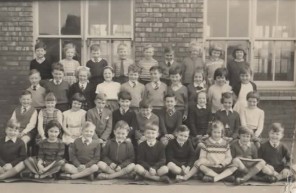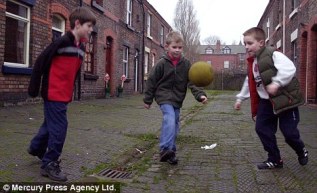From Fazakerley to Seacombe. It was a familiar journey. My other Nan was in Liscard with my Auntie and her family. Every two weeks we took the bus-ferry-bus to go and see them. I liked Fazakerley. It was big and open. We had big gardens and big fields. The fields are now home to a massive hospital. It was a great playground.
Moving to Seacombe was a culture shock. Even for a young fun-loving seven year-old, I knew it was different. It was not big and open, our garden was tiny and it was not a playground. There was traffic. We were surrounded by main roads. Wherever we went it was a symphony of engines, roaring to the melody of urban life. I remember looking round for potential adventure. There was the promenade and the beach, the alleyways behind the houses and two sets of garages at each end of the road. The three groves, Mulberry, Myrtle and Wesley looked good too. A cul-de-sac was a football and cricket paradise.
Alas, some of these places were out of bounds. The prom certainly was; it was across one of the main roads with a big river on one side. It took some getting used to but gradually it began to feel like home. Borough Road was great. It had shops. There was a wood shop (Winson’s), a couple of butchers, a fishmongers, Frank Hunter’s the furniture shop and the Dolls’ Hospital. I loved the Dolls’ Hospital; all those toys. You would walk in the shop to have your eyes assaulted by a myriad of colours and happy smiling painted faces. All those boxes. It was a birthday money treat. I don’t know which one I preferred more; the Dolls’ Hospital or the Hobbies Shop in Liscard Crescent. At the bottom of Kenilworth was Mercer’s the grocer. That was a main food supply. There were also two small supermarkets, one of which was Tescos by the post office. At the bottom of the road were the other old shops. There was Johnny Halam’s junior boxing club, a pet shop and a barber’s shop. But it was the houses and flats above those shops. They were massive with three floors and an attic. We had some friends who lived in one of these places. We could go up onto the attic and actually creep along into other people’s houses through little wooden doors in the wall. “Look at you, you’re filthy,” said Mum. It was a common remark; less of a remark, more of a lament. The longer we were there, the bigger the playground got. Best of all was the church on Brighton Street. I don’t think it was being used because we could climb over the wall in Wesley Grove and get into it. Almost every door was open. The main church felt like a cathedral. It was dry and wooden. The ceiling was high away in the heavens and the peripheral staircases offered ladders to adventure.
As we settled into our new lives everything became fun and familiar. “When are we going to Riverside?” I once asked my Mum. “You’re not,” came the curt reply. Now this brings me an important point. Before moving to Kenilworth, we had spent four months at my Auntie’s in Liscard while our house went through. I naively celebrated the idea of four months of no school until my Mum took us along to Egerton Grove.




